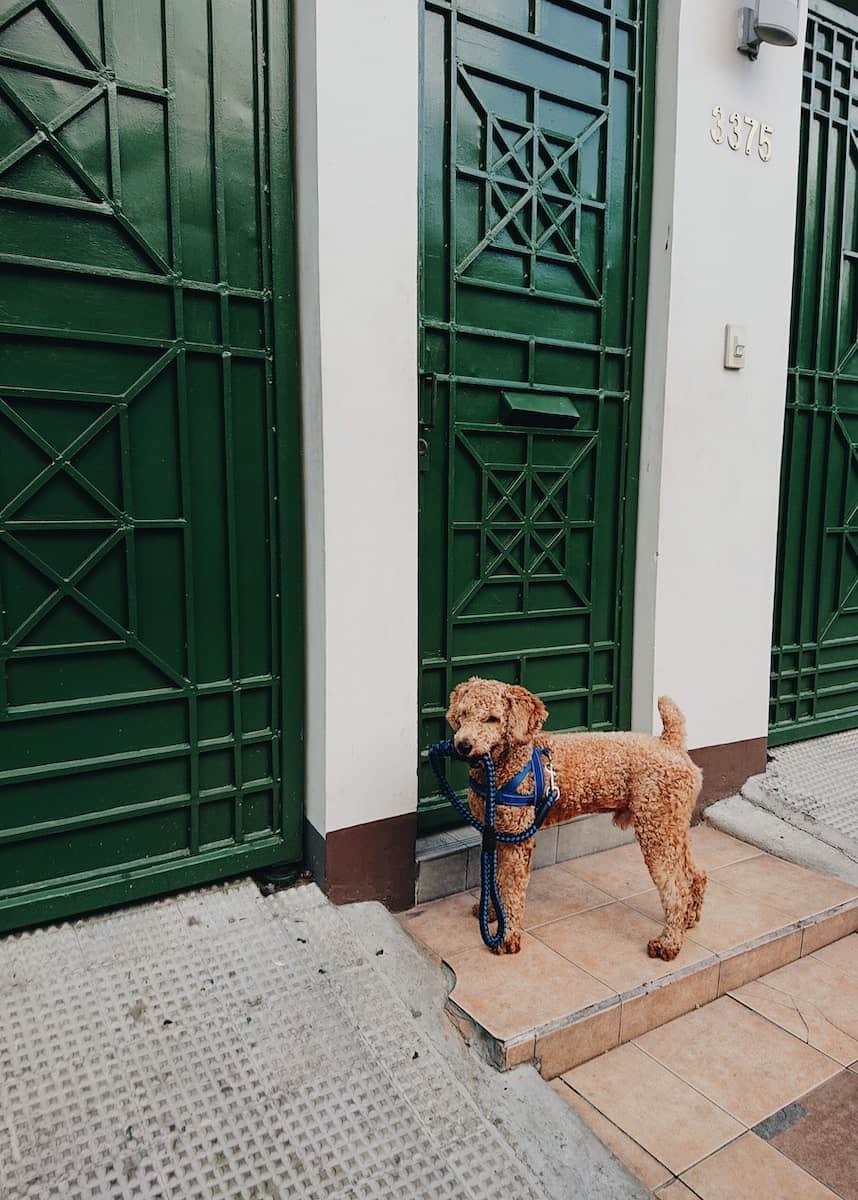
One of the most important steps in the adoption process is selecting a reputable rescue organization or shelter. It’s crucial to do your research to ensure that the organization you’re considering is reputable and has a proven track record of placing animals in safe, loving homes. Be wary of organizations that seem unprofessional, do not offer an adoption contract or require a wire transfer or credit card payment before the adoption.
Another important factor to consider is the poodle’s medical history and any medical issues they may have. This is particularly important if you have limited resources for veterinary care and cannot afford to take on a significant medical bill. Be cautious of breeders or organizations that do not provide thorough medical information or vet care for their animals.
Additionally, keep an eye out for any behavioral issues and concerns, such as separation anxiety or a boundless energy level. These issues may require extra time, attention, and resources to address and may impact your decision to bring the animal into your home. It’s crucial to speak to the current or previous owner, as well as the shelter staff, in order to get a better understanding of the dog’s personality and potential behavior concerns.
In conclusion, adopting a poodle can be a wonderful experience for a prospective pet parent, but it’s important to be aware of any warning signs or red flags during the adoption process. By doing your research, asking the right questions, and thoroughly considering all factors – including medical history, behavioral issues, and the reputation of the rescue organization or shelter – you can make an informed decision and give your new pet the loving, responsible home they deserve.
Personality and Behavior of Poodles to Consider
Poodles are intelligent, active, and social dogs that make excellent additions to families. However, as with any other breed, there are some personality and behavior traits that potential pet parents should consider before adopting or rescuing a Poodle.
Energy Level
Poodles are high-energy dogs that require daily exercise. A lack of physical activity can lead to behavioral issues such as separation anxiety, boredom, and destructive behavior. Potential pet owners should ensure they have the time and energy to properly exercise their poodle.
Potential Behavioral Concerns
As with any dog, Poodles may exhibit certain behavioral issues. Potential pet owners should ask the foster family, shelter staff, or previous owner about any behavioral concerns or history of aggression. It’s also advisable to seek the advice of a behavior consultant or professional if any behavioral issues arise after adopting a poodle.
Health Issues
Like all purebred puppies, Poodles may be susceptible to certain health issues. Reputable breeders should provide a comprehensive medical history of the puppy’s parents and any relevant health certifications. Adoption agencies, shelters, and rescue organizations should also provide a complete medical history of the adoptable animal.
The Adoption Process
It’s essential to do thorough research before choosing an adoption agency, rescue organization, or shelter. A reputable animal shelter or rescue organization should perform a behavior assessment and provide veterinary care before placing the animal in a forever home. In contrast, a backyard breeder, puppy mill, or fake dog rescue may offer puppies at a lower adoption fee, but the animals may have medical or behavioral issues that can result in costly medical bills for pet owners.
Medical Care
Potential pet owners should be prepared to provide routine veterinary care, including vaccinations, preventative medication, and regular check-ups. It’s essential to factor in the cost of veterinary care when considering the adoption fee.
Warning Signs to Look For
It’s essential to be aware of warning signs that a shelter or rescue organization may not be reputable. Fake dog rescues, puppy mills, and backyard breeders often produce animals with medical and behavioral problems. It’s essential to do thorough research, ask for references, and visit the shelter or rescue before adopting.
Final Thoughts
Adopting a Poodle can be a rewarding experience for the pet parent and the dog. It’s essential to choose a reputable shelter, rescue organization, or responsible breeder and be aware of the dog’s energy level, potential behavioral issues, and medical care needs. With proper care and attention, a poodle can bring boundless joy and companionship to any household.
Signs of Neglect or Abuse
When considering a poodle rescue or adoption, it’s important to be aware of potential signs of neglect or abuse in the dog’s history. These warning signs may indicate that the pet parent or previous owner didn’t provide adequate veterinary care, socialization, or training. It’s important to understand that rescue organizations, reputable breeders, and adoption agencies have varying adoption fees, adoption processes, and application requirements. Here are some red flags to watch out for:
- Poor physical condition: If the poodle has matted fur, hair loss, or visible signs of injury, it may indicate a lack of grooming or delayed veterinary care.
- Behavioral issues: Separation anxiety, fearfulness, or aggression can be signs of a troubled past or inadequate socialization.
- Medical issues: If the poodle has a medical history that includes severe health concerns such as hip dysplasia or retinal atrophy, it’s crucial to assess whether you’re able and willing to take on any potential medical bills.
- Backyard breeders or puppy mills: If the adoption agency works with breed-specific rescues or reputable shelters, it’s usually a good sign. If the organization is affiliated with pet stores or backyard breeders, be wary.
- Unwillingness to conduct behavioral assessments: A reputable shelter staff or animal shelter worker should be able to provide you with insights into the poodle’s energy level, house training, and behavior concerns. If a rescue organization or breeder is unwilling to provide this information, it’s a cause for concern.
- Unrealistic promises: Adoptable animals may require a significant amount of time, patience, and veterinary care before they adjust to their new surroundings. Beware of non-profit or no-kill rescue organizations that promise a “perfect” dog without behavioral concerns.
- Credit card payment only: Legitimate breeders and reputable animal shelters may offer the option to pay with a gift card or wire transfer. If a rescue organization or breeder requires a credit card payment without alternatives, it may be a red flag for a fake dog rescue organization.
So, before you select a poodle rescue or adoption agency, do your research to ensure that you’re working with a trustworthy breeder or legitimate shelter. It may take some time, but finding the right pet owner is worth the wait. Remember that adopting a dog is a tough decision, but it can change both your life and your new dog’s life for the better.
Important Health Issues to Note
It’s vital to be aware of any potential health issues that may arise with a rescued poodle. To ensure the best possible adoption experience, it is important to consult with a veterinarian and fully understand the medical history of the dog before making the final decision to adopt.
Medical History
When adopting a rescue poodle, it’s important to gather as much information as possible from the previous owner, animal shelter, or rescue organization. Inquiring about the medical history and any pre-existing medical conditions can help prepare you for any potential issues. You should also have access to any medical records, including vaccination history and past treatments.
Separation Anxiety
Many rescue dogs, including poodles, can experience separation anxiety due to the stress of being abandoned and rehomed. This can result in destructive behaviors, such as chewing or excessive barking. If your rescue poodle shows signs of separation anxiety, it is important to take necessary steps to correct these behavioral issues, such as crate training, providing mental stimulation, and gradually increasing the time spent apart.
Hip Dysplasia
Hip dysplasia is a genetic condition that can affect poodles. It is important to inquire about the breeding program of the previous owner or rescue organization and only adopt from a reputable and responsible breeder. Symptoms of hip dysplasia could include limping, reluctance to walk, difficulty rising and laying down, and a bunny hop-like gait.
Eye Problems
Poodles are prone to various eye problems, including retinal atrophy, cataracts, and eyelash abnormalities. When considering a poodle adoption, it’s essential to request a detailed medical assessment from a reputable shelter, veterinarian, or animal shelter worker to determine whether the dog has any significant eye problems.
Hair Loss
Hair loss in poodles can indicate a vast array of medical or behavioral concerns. It is important to investigate thoroughly the reasons behind the hair loss. While it can be a symptom of hot spots or allergies, it can also point to other, more severe health issues.
House Training
Many rescue poodles have been through a lot of turmoil and stress, often leading to a breakdown in their house training habits. It is essential to establish clear and consistent training techniques that are tailored to suit their particular needs. This will not only make the transition to your home easier, but it will also set the stage for a successful adoption.
Cost of Care
Adopting a rescue poodle comes with a few costs, such as the adoption fee, credit card payment, or a gift card, and the responsibility of veterinary care. It is necessary to determine whether you can afford the associated expenses, including any medical bills that may arise.
In conclusion, adopting a rescue poodle is a decision that requires consideration. Be sure to research and take your time before adopting. Requesting a reputable and responsible rescue organization can offer a vast array of benefits, including behavioral and medical assessments, and rehoming options for shelter dogs.
Questions to Ask the Rescue or Shelter
When considering adopting or rescuing a poodle, it’s essential to gather as much information as possible to ensure a smooth adoption process and a happy homecoming for you and your new furry friend. Below are some essential questions to ask the rescue or shelter.
1. Can you tell me about the poodle’s medical history?
It’s crucial to have a complete understanding of the pet’s medical history before making a tough decision. Ask the shelter staff if the poodle has any present or past health concerns, such as hair loss, hip dysplasia, or retinal atrophy. Additionally, find out if there are any current medical issues that require attention and if the animal has received adequate veterinary care. Remember, adopting a pet comes with an adoption fee and potential medical bills, so understanding the pet’s medical condition in advance is crucial.
2. What kind of behavioral concerns does this poodle have, if any?
Behavioral issues are another significant consideration when adopting a poodle. Ask the shelter staff about their experience with this specific animal and if they have noticed any behavioral concerns, such as separation anxiety, aggressive behavior, or house training issues. Find out if the poodle has undergone any behavioral assessments or worked with a professional behavior consultant.
3. How long has this poodle been in the shelter, and why did they end up here?
Understanding the animal’s background, and where they came from is a crucial element to consider. Ask the shelter staff about the poodle’s previous owner or if they were a stray. Knowing how long the animal has been in the shelter, and whether they have been moved between different shelters can also help prospective pet parents understand why the animal might have any behavioral issues.
4. What is the shelter’s adoption process, and what kind of adoption contract do you have?
Each rescue, shelter, and adoption organization has a different adoption process, whether it’s an open admission shelter, a fair warning shelter, or a no-kill shelter. Ask the staff about the shelter’s specific process, including how to fill out an adoption application, the adoption fee, and whether any health or behavioral professional assessments are required. Find out if the shelter offers a rehoming option or if they have any specific terms in the adoption contract.
5. What happens if I can no longer care for this poodle?
Finally, before adopting a poodle, it’s crucial to have an understanding of the future and what happens if the adoption doesn’t work out. Ask the shelter staff if they have any rehoming policies or if there’s a network of rescue organizations that operate in the area.
Overall, finding a reputable shelter or rescue organization and responsible breeder is critical to adopting a happy, healthy poodle. Remember that buying a pet store puppy or adopting from a backyard breeder contributes to the puppy mill industry, leading to millions of dogs living miserable lives. Opting for a breed-specific rescue or a trustworthy breeder ensures you and your new loved one’s safety, boundless energy, and compatibility.
The Importance of Meeting the Poodle
When considering adopting a Poodle, it’s essential to meet the dog before making any decisions. Meeting the Poodle will allow you to determine if their energy level matches yours and assess their overall health and behavior. Here are some reasons why meeting the Poodle is crucial:
1. Assess Behavioral Issues
Meeting the Poodle will help you determine if there are any behavioral concerns or issues that you need to be aware of. You can observe the Poodle’s behavior, such as their level of socialization and how they interact with people and other dogs. Behavioral issues can include separation anxiety, aggression, fearfulness, or other concerns that could affect your home.
2. Evaluate Energy Level
Poodles are an active breed with boundless energy. Meeting the Poodle will help you determine if their energy level matches yours and your lifestyle. Whether you’re looking for a Poodle that loves to run and play, or one who prefers a more leisurely pace, meeting them is key to finding the right match.
3. Assess Health Concerns
Meeting the Poodle will allow you to check for any apparent health issues like hair loss, hip dysplasia, or retinal atrophy. You can ask the shelter staff or the previous owner about the dog’s medical history, the medical care they have received, and any medical bills that you might be expected to cover.
4. Ensure a Responsible Adoption Process
Meeting the Poodle is also your chance to get to know the shelter staff or rescue workers and ask them about the adoption process and contract. A reputable shelter or rescue organization will have a thorough application process and may also charge an adoption fee, which is usually around $200 and helps to cover the cost of veterinary care and other expenses. Make sure you receive an adoption contract, which outlines the responsibilities of both the shelter and the pet owner.
5. Avoid Warning Signs
Meeting the Poodle can help you avoid any warning signs that the dog may not be a good fit for your home. If you notice any red flags during the meeting, such as aggressive behavior or health concerns, it’s best to walk away. Be wary of backyard breeders or puppy mills posing as reputable breeders or rescue organizations. Always research the organization or breeder before proceeding and avoid giving out your credit card information or making wire transfers.
In summary, meeting the Poodle is a crucial step in the adoption process. Take your time to evaluate their behavior, energy level, and health concerns, and ensure that you’re working with a reputable shelter or adoption organization. By taking these steps, you’ll be on your way to becoming a responsible pet parent to a Poodle who needs a loving home.
Assessing Compatibility with Your Lifestyle
If you’re considering bringing a rescued Poodle into your home, it’s essential to assess your unique lifestyle to ensure a smooth transition for both you and the Poodle. Understanding your energy levels and daily routine will help you find a rescued dog whose personality and needs match yours. Here are some things to consider as you assess compatibility with your lifestyle:
Energy Level
Poodles have a boundless amount of energy, so it’s essential to know if you can give them the attention and exercise they require. If you’re an active pet parent who likes long walks and runs or a retired pet owner who loves spending days at the park, then a Poodle’s playful and energetic nature may fit perfectly with your lifestyle.
Behavioral Concerns
Behavioral issues are expected when it comes to rescued dogs. However, not all concerns can be corrected, especially when the dog’s history is unknown. Before adopting a rescued Poodle, ask about any behavioral issues they may have and if the previous owner or rescue organization have worked with a behavior professional on such matters.
Medical History
It’s best to scrutinize the medical history of any Poodle in which you’re interested. Ask about their medical issues, behavioral issues, and previous injuries. Some legitimate reasons to walk away are aggression, hip dysplasia, or retinal atrophy.
Adoption Process
A reputable rescue organization or animal shelter worker places adoption fees on almost all adoptions to offset the organization’s cost and cover the pet’s veterinary care. The fee includes spay/neuter, vaccinations, and other medical care. The adoption process should include a behavior assessment to discuss any pet owner concerns. Suppose the rescue agency doesn’t provide transparent answers to your questions. In that case, it may be best to look for a more trustworthy rescue organization or reputable breeder.
Warning Signs
Be on the lookout for any red flags or warning signs when speaking to previous owners or adoption agencies. If they pressure you into an adoption decision or accept payment only by wire transfer or gift card, it’s best to walk away. Fake dog rescues or puppy mills that sell dogs through pet stores are just a few bad apples that give adoption agencies a bad name.
It is your responsibility as a potential pet parent to research, ask questions, and interview those involved in the Poodle adoption process to provide the furry friend you choose with the best and happiest home possible.
Considerations for Adopting a Senior Poodle
If you’re considering adopting a senior poodle, there are a number of things you need to take into account. As with any dog adoption, it’s important to think carefully about whether this is the right decision for you, and whether you’re prepared to give your new pet all the care and attention they need.
Here are some important things to consider when adopting a senior poodle:
1. Health Concerns
Older dogs may have more health issues than younger dogs, so it’s important to be prepared for the possibility of medical bills. You should have a thorough understanding of the dog’s medical history, any health issues they have, and what kind of care they may need in the future. You should also be financially prepared to cover any medical bills that may arise.
2. Energy Level
While many people assume that older dogs are less energetic than younger ones, this isn’t always the case. Senior poodles can still have boundless energy and require daily exercise. Before you adopt, consider whether you’re able to keep up with their energy level.
3. Behavioral Issues
Senior dogs may also have behavioral issues, such as separation anxiety or aggression, that you need to work through with them. When considering adoption, make sure you’re prepared for the possibility that your new pet may need additional behavioral support.
4. Adoption Fee
Adoption fees for senior dogs are often lower than those for puppies or young dogs, but they can still be expensive. Some rescue organizations or shelters may waive the fee for senior dogs, but you should be prepared to pay some amount to support the shelter’s efforts.
5. Adoption Process
The adoption process for senior dogs may be more rigorous than for younger dogs. Shelters may require extra references, home visits, or interviews to ensure that the adopter is able to provide the necessary care and support for a senior dog.
6. House Training
Senior dogs may already be house trained, but you should still be prepared for accidents as they adjust to their new home. You may need to spend some time re-training your new pet.
7. Tough Decision
Adopting a senior dog can be a tough decision. Knowing that your new pet may only have a few years left can be emotionally challenging, but it’s important to remember that you’ll be providing them with a happy and loving home for however long they have left.
Remember, if you’re considering adopting a senior poodle, make sure to do your research and adopt through a reputable rescue organization or animal shelter. Avoid backyard breeders or pet stores, as they may be dealing with puppy mill dogs or have other warning signs to look out for. A reputable shelter or breed-specific rescue will have staff on hand to answer questions and help you find the perfect senior poodle for your family.
Preparing Your Home for a Poodle Adoption
Before adopting a poodle, you need to prepare your home to ensure that your new pet feels welcome and comfortable. Here are some tips to consider:
- Secure Your Home: Poodles are energetic and curious dogs with boundless energy, make sure your home is secure and safe. Tuck away any cords, cables, or plants that could be chewed, and keep chemicals and sharp objects out of reach. Secure any hazardous items such as cleaning agents, tools, or sharp objects in a high cabinet or locked closet.
- Buy the Right Supplies: Invest in supplies before your newest family member arrives. Purchase items such as a high-quality dog bed, dog crate, leash, collar, food and water bowls, and a variety of toys that will keep your poodle entertained.
- Find a Trusted Veterinarian: Being a responsible pet owner means ensuring that your poodle receives the necessary veterinary care. Find a veterinarian that meets your needs and preferences. Whether you prefer a traditional veterinary practice or a holistic approach.
- Stay Prepared for Medical Issues: Similar to human beings, dogs can suffer from an array of medical issues. Ensure you both understand and are financially able to care for any potential medical issues that may arise.
- Discuss Separation Anxiety: Poodles often suffer from separation anxiety, and it can lead to destructive behavior. Discuss this with the adoption organization or shelter staff and find ways to help your new pet adjust to your absence gradually.
- Puppy Proof Your Home: If you are adopting a puppy, make sure to puppy proof your home. Poodles are intelligent and easily trainable, but they can become confused, overwhelmed and misbehave when overloaded with information.
As a pet parent, it’s important that you are knowledgeable about your poodle’s medical history, any existing medical concerns or issues. Keep all medication and medical bills in a safe place. For those that adopt, understand the adoption process, which will require an adoption fee at times, and know that house training and behavioral concerns may be an issue. Always be on the lookout for any warning signs or behavioral concerns, understanding the animal’s previous history would be helpful in addressing any concerns upfront. If behavioral issues are discovered or continue, seek out a behavior consultant or professional.
By properly preparing your home for a poodle, you will help ease the transition for your new family member. Remember to stay informed, get your financial coverage in order, and ask for help when you need it. Overall, adopting a poodle can be a rewarding experience for both you and your new furry friend when done with proper guidance and insight.
Understanding the Adoption Process
If you’ve decided to adopt a poodle, congratulations! You’re taking an important step towards providing a loving home for an adoptable animal. However, the adoption process can be lengthy and intimidating, especially if you’re a new pet parent.
The first and most crucial step is finding a reputable adoption organization. This can be either a shelter, a breed-specific rescue, or a legitimate breeder. Your ultimate goal should be to rescue a poodle, rather than buying one from a pet store or a backyard breeder. The vast majority of pet store puppies come from puppy mills, where they’re kept in miserable conditions and are often plagued by physical and behavioral issues.
Once you’ve found a reputable shelter or rescue organization, you’ll begin the adoption process. This typically includes filling out an adoption application, paying an adoption fee (usually via credit card), and meeting with a staff member or a foster family to discuss the poodle you’re interested in.
Before you adopt a poodle, it’s important to understand what you’re signing up for. Poodles have a boundless energy level and require consistent vet care, such as vaccinations and checkups. Additionally, some poodles may have behavioral or medical issues, especially if they had a challenging past with their previous owner or were in an overcrowded shelter for months.
A reputable shelter or rescue organization will disclose any known behavioral or medical concerns with you during the adoption process. However, the responsibility as a pet owner lies with you to provide the proper veterinary and behavioral care for your new poodle.
It’s also important to note that some adoption organizations have strict adoption policies, such as requiring a house training plan or an adoption contract. These policies are in place to ensure that the poodle is going to a responsible and loving home, not to make your adoption process harder.
As you go through the adoption process, keep in mind that you’re making a meaningful and tough decision. By adopting, you’re giving a shelter dog a second chance at a happy and healthy life. And remember, if you encounter a red flag or a warning sign, such as a fake rescue organization or a dog with a history of aggression, you can always walk away and seek out a reputable shelter or rescue organization elsewhere.
If you have any behavioral or medical concerns with your newly-adopted poodle, seek out a reputable veterinarian or behavior consultant as soon as possible. With proper vet care and training, your poodle can thrive in their new home.
Conclusion and Final Thoughts
In conclusion, adopting from a reputable poodle rescue organization or shelter is a great way to provide a loving home to an adoptable animal in need. However, it’s important to keep an eye out for warning signs that the adoption may not be in the best interest of you or the dog.
Before adopting, make sure to thoroughly research and visit various shelters and rescues to find a reliable and trustworthy organization. Consider reaching out to breed specific rescues or reputable breeders to adopt a purebred puppy if that’s what you’re looking for.
Take into account adoption fees, veterinary care costs, and the adoption process in general. Reputable shelters and rescues will have a detailed adoption application and contract, and may also do a home visit or interview with you before approving the adoption.
Be cautious of backyard breeders, puppy mills, and fake dog rescues. Their dogs often come with health issues, behavioral concerns, and a history of a miserable life. It’s important to properly address any medical issues or behavioral concerns with the help of a reputable veterinarian and/or behavior consultant.
Remember that being a responsible pet parent includes providing proper veterinary care, training, and love for your pet. If you cannot properly care for your pet, consider reaching out to a reputable shelter or rescue organization for rehoming options.
It’s fair warning to stay away from extreme “no-kill” shelters or overcrowded shelters, which may lead to longer months in the shelter and a poor quality of life for the dogs. On the other hand, a reputable animal shelter is dedicated to providing the best possible care for the animals and finding them a loving forever home.
In the midst of the COVID-19 pandemic, consider making a gift card or credit card payment to donate towards the medical bills and other costs incurred by shelters and rescues. This helps support the network of rescues and non-profit organizations dedicated to helping dogs in need.
Overall, it’s important to thoroughly consider multiple options and do your research before making the tough decision to adopt a dog. With the right preparation, you can provide a wonderful home to a poodle with boundless energy and love to give.





